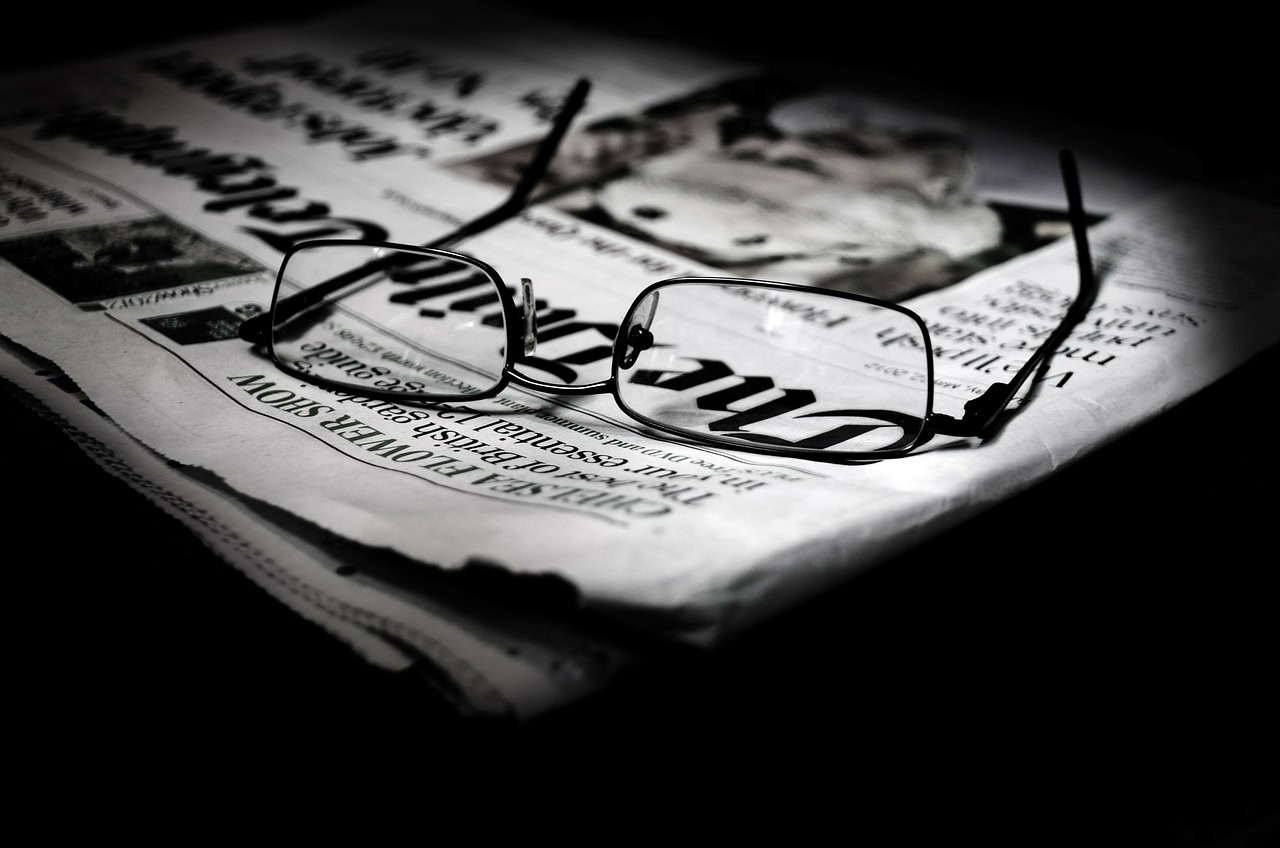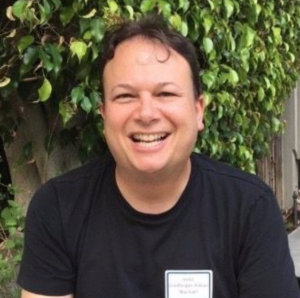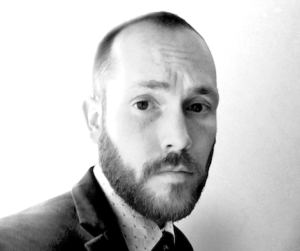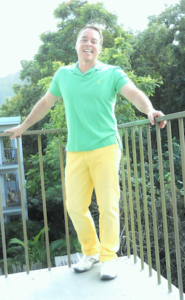Matthew Forbes is an incredibly talented screenwriter currently residing in the Toronto area. Matt won the 2022 San Francisco Screenwriting Competition with his brilliant script aptly entitled “L Section”. We sent Matt a few questions after his win, and he was nice enough to respond:
- What's your background? How long have you been writing? And what made you choose and or transition into screenwriting?
I'm mixed-race -- my mother was Black and my father was Ukrainian. I've been writing all my life, really. I come from a background in journalism, and I also teach in public schools. I've always wanted to write and direct, but the paralysis of early Covid meant that, although I was homeschooling my kids, I still had a fair bit of time on my hands. I had a short film project that was stuck on hold, so I decided to tackle the feature that had been bouncing around in my head. Pre-covid, teacher and dad, post-covid, screenwriter and director, submitting to festivals!
2. What screenwriting training have you received? And what were some of your biggest breakthroughs?
No formal training in screenwriting. I majored in journalism and worked in news production for many years, as well as digital marketing. Writing has always been a way of life, but my biggest breakthrough took place in early 2022. I wrote a short script entitled "David," based on the life of a friend of mine named David Shannon, who passed away in 2018. During the HIV/AIDS crisis of the 1980s, he assisted dying patients who had been rejected by their loved ones when their diagnosis forced them out of the closet. I never knew this chapter in his life, and as someone who is bisexual and genderqueer, David's story really spoke to me on a deep level. I filmed the short (about 10 minutes runtime) in the spring and it's out among the festivals right now. After the stress of lockdowns, it marked a true rebirth for me. I'm an honest-to-God filmmaker!
3. What else have you written? What writing habits work for you? Do you write in short bursts or long shifts, in the morning or late at night, do you write at coffee shops, at home, or at the office when no one else is looking?
In addition to L Section and David, I've got notes and outlines for other features. I also have a novel that could stand another rewrite, and a ton of blog posts and assorted articles. As for my writing habits, I definitely prefer long shifts because it usually takes me awhile to get my proverbial motor running. My best time for writing is in the morning, though as a dad I often have to wait till later in the day. I prefer writing in a cafe, but wherever I am I've got my headphones on and I'm blasting heavy tunes; and if I'm at home I'm writing with my cat next to me, for hours, her eyes closed and vibing.
4. What's the title of the script you entered, and what's it about?
L Section is about a section of elite soldiers in the Canadian military. While serving in Afghanistan, they encounter a tough situation but are rescued by their sergeant. Later they have a hard time adjusting to civilian life, and so their sarge embarks on a cross-country road trip to gather them all back together. It's about trauma -- not how we get it, but how we deal with it and all the upset and laughter that entails.
5. Where do you look for inspiration and what inspired you to write this script?
I base everything on characters. I put myself in their shoes and wonder what their lives would be like, how it would feel, how real people would react to real situations. To me, it's key to creating a readable script. In this case, I was really getting into the work of Sebastian Junger, who spent a lot of time with US Army soldiers and veterans. He looked at their trauma, their devastating suicide rates, and found that the biggest source of their suffering is the jarring transition from the tight tribe of a combat unit to the cold, indifferent, atomized reality of civilian life. I wanted to explore that concept in a feature script, and the more I wrote the more real it felt. When it comes right down to it, we can't cure each other's trauma but we can (and should) keep each other safe -- and loved.
6. Describe your process? Do you outline your story first? Do you use notecards or a beat sheet? Or do you simply sit down and let it flow?
When I begin a new project, I start with characters. I flesh them out in my mind, every detail possible. I have a vague idea of plot points, but the priority is the characters. At this point I'm going on long walks and drives in the country, chewin' it over and thinkin' about the characters. I think it builds a kind of empathetic connection with them ... I'm not sure how it works, but at some point they start to feel real. Then I begin writing, starting with short biographies, which include interactions with other characters. Then I start outlining the plot, but I don't go too far because I don't want to lose that element of discovery. So I start writing the script itself, taking occasional breaks to outline the plot a bit further. Honestly, though, for the most part the writing happens in my head. Oddly, by the time I'm done, I find I only need light revisions. I've tried using mind maps and beat sheets, but I find they trip me up more than they help. A key component of my writing is flow, and mapping things out too much, I find, breaks up that flow.
7. What was your experience with our festival? Are you happy with your involvement? What did you like most about your experience? And what could we improve on?
I discovered San Francisco International Screenwriting & Cinema on FilmFreeway, and was immediately struck by the glowing reviews. I knew I had to submit my script to your festival. Sure enough, it turned out to be one of the best experiences I've had in the industry. The communication has been phenomenal, not to mention supportive. Honestly, in an industry that can be rough, it's such a joy to deal with a festival that is so professional and encouraging. I wouldn't change a thing!
8. What are you writing now and what do you plan on writing in the near future?
I've begun writing a feature set in Ukraine in 2022. I also have a horror feature script called Dark of Night that's out in festival-land and has won some awards. Beyond that, I have notes for quite a few low-budget indies that I hope to get around to eventually.
9. Any advice for those about to dive into their first feature-length screenplay?
Yes. The characters are human beings. They live, and breathe, feel and react like real people. In a world where so many writers take comfort in tropes, I really think we should be striving to put characters first. Instead of creating a clever plot then trying to jam everything into it, put your characters into believable situations and see what choices they make, based on who they are and how they've lived their lives. Your characters need to really matter to you! I honestly think that writing becomes so much easier when they feel real.
10. Last, but not least, what have been your biggest victories since entering our festival? Any more awards, any representation, any options, connections, new opportunities, and or plans to move to New York or LA?
Well, since entering your festival (a huge victory in of itself, I assure you), I've begun winning awards for the short film I made earlier this year. It really has been an amazing 2022! I don't have representation yet (agents, call me!), because I've been too busy making my stuff. However, partly boosted by you guys, your amazing notes and soul-filling encouragement, I'm just about ready to start pitching my feature. I want to get this thing made! As for moving ... I don't want to jinx anything! I'll just say I don't have any immediate plans in that regard.
Thanks for everything, guys!
Matt

An interview with the brilliant and very talented Kasper Kavalaris screenwriter of Kept, our 2022 grand prize winner.
What’s your background? How long have you been writing? And what made you choose and or transition into screenwriting?
I’ve been writing since 1998 but my day job has been in the visual arts. In 2012 I was working as an illustrator for indie comics and I was given the opportunity to become a script doctor for a comic I was illustrating. When that project won some awards, it wasn’t long before I had moved away from comics and had begun writing screenplays.
What screenwriting training have you received? And what were some of your biggest breakthroughs?
I am self-taught in screenwriting. I’ve read a few books on the technique as well as many screenplays, and of course, I’ve watched thousands of films. My experience in the comics industry also helped a great deal.
What else have you written? What writing habits work for you? Do you write in short bursts or long shifts, in the morning or late at night, do you write at coffee shops, at home, or at the office when no one else is looking?
I’ve written two other features and two shorts but I consider 'Kept’ to be my first truly successful attempt.
While I am more productive with coffee, I get more unique ideas without any chemical assistance. I prefer to work at home with instrumental music playing. It took me two months to bash out the first draft to ‘Kept.' I find writing to be relatively easy, as long as I’m in a good physical and mental state. In fact, I find writing to be much easier than visual art, an industry I have been working in for more than two decades.
I usually write in long shifts. A good day is 6 to 8 hours. My morning routine is crucial for my productivity: Wake up before sunrise, work out, stretching, yoga, then meditation.
What's the title of the script you entered, and what's it about?
The script I entered is entitled, 'Kept.' It is about a famous Manhattan author who, after narrowly surviving an overdose, moves her family to an old mansion in the country so she can try to fix her life, but when the children claim to have seen ghosts roaming the halls, she knows her deepest secret is in danger of being revealed.
Where do you look for inspiration and what inspired you to write this script?
I get an average of a few script ideas per week. I’ll never have time to manifest them all. My ideas come to me randomly during the day, and I have developed a practice of stopping to record them in a document. I also get ideas from dreams and in meditation. In fact, the script I am working on now came to me fully formed during a meditation.
My inspiration for ‘Kept' came from a single question: Is it possible for a series of bad decisions to lead to a positive outcome? Originally, the story was going to be set in the 1800s, with a surgeon as the main character. My interest in the challenges of addiction and of relationships, and my desire to write a female anti-hero are what led me to create Liv, the main character.
Describe your process? Do you outline your story first? Do you use notecards or a beat sheet? Or do you simply sit down and let it flow?
My method changed with 'Kept,' and I lament having taken this long to finally figure it out. I used to just start writing. I’d create a detailed treatment, maybe 20 pages, and then I’d just dive in. It wasn’t until later that I realized this method always created problems with the structure, tension, and pacing of the story. With ‘Kept’ I used a method that I learned from watching an interview with screenwriter Brooks Elms that he calls the ‘7 Step Process.' It’s a very simple outline technique that solves most structure and pacing issues, and makes the rest of the writing a breeze.
What was your experience with our festival? Are you happy with your involvement? What did you like most about your experience? And what could we improve on?
The San Francisco festival was a lot of fun for me. I very much enjoyed the consultations and the special attention, including personal phone calls with Joseph.
What are you working on now?
I am currently working on a pilot for a science-fantasy adventure series. I plan to have a final draft in a few months and will be entering it into competitions. I also have a few other projects at the treatment stage that I will be developing further. Sci-Fi has always been my favorite genre to write, but after such an enjoyable experience with ‘Kept,' I plan to try my hand at the drama genre again in the future.
Any advice for writers who are just starting out?
I have two pieces of advice for first time screenwriters. The first comes from the book by Robert Ben Garant and Thomas Lennon (of Reno 911) entitled, 'Writing Movies for Fun and Profit: How We Made a Billion Dollars at the Box Office and You Can, Too!’ Paraphrasing their advice, the essentially say to write a screenplay, then forget about it, then write another one, forget about that one, and then finally you may have a good screenplay on the third try. I didn’t heed that advice, but it turns out that’s exactly what happened.
My other piece of advice is to buckle down and learn to outline the story. This knowledge should have translated from my art training. It’s much easier to fix problems in a drawing at the sketch stage, than it is once you have all the shading and color applied. I believe we are likely to have a bias against fixing structural problems at the later stages because we subconsciously know just how much work would go into such an effort, and so we pretend the problems don’t exist.
Learn to outline.
Early on, whenever I thought about outlining, it felt cold, uncreative, and un-fun. Then I learned to imagine that I’m just telling the story to a friend. That is basically the outline. In Brooks Elms' method, you tell the whole story in one line, which ends up being your logline. Then you tell the story in a few lines. Then 15 lines. And finally, you tell the story in 40 lines. Then you can move those lines around until you get a solid structure. After that, it’s just a matter of fleshing out each of those 40 lines into about 3 pages (max) per line.
What are you next steps and do you plan on moving to NYC or LA?
I actually moved to LA in 2020. I’d been there only three months, ready to try to make it in Hollywood, and then the pandemic hit and I decided I wanted to live near family. In the end I think it was good because it gave me time to finish my second screenplay, realize the problems with it, and then write, ‘Kept,’ after which I now finally feel ready for Hollywood.
‘Kept’ has two first place wins, one second place, one honorable mention, many finalist placements, and was made the official selection of over 20 festivals. It also received an 8 out of 10 rating on The Blacklist, which I hear is a pretty good score. All this attention has gotten me some interest from agents and producers.
I have had some talks with Netflix and Dreamworks. In both cases, I was told that our talks can’t continue until I have an agent, so that is my current goal.
I’m very happy to have been able to participate in the San Francisco Int’l Screenwriting Competition!
Joseph, Thanks again for all the personalize attention. It really added to my experience of the festival.
Cheers
Kasper Kavalaris

An interview with the brilliant and talented John Dorsey screenwriter of Profit, our 2021 grand prize winner.
What’s your background? How long have you been writing? And what made you choose and or transition into screenwriting?
I am the son of a failed magician and a successful businesswoman, which pretty much doomed me to be involved in the arts.
However, I wasn’t always interested in writing. Growing up, I thought I’d be a comic book artist, and even chose my college (SCAD) based on their comics program. Part of SCAD’s Sequential Art program involved a screenwriting class, and after the first week I was hooked.
From there I switched my major, and learned to love the collaborative nature of filmmaking. While screenwriting is my first love, I’ve been working in the industry for the past ten years, using my experience in film and television to inform my journey as a writer.
What screenwriting training have you received? And what were some of your biggest breakthroughs?
I took screenwriting classes in college, read the books, but I was a remarkably bad student then.
I didn’t really have a break through until I tried to write a comic book. I can’t tell you where I read this, but someone said that in comics you “write for the page turn.” Every other page something interesting should happen to justify that turn, and then you end the issue with a cliff hanger. Once you do that about 5 - 6 times, you have a beat sheet for a feature length film.
While I don’t use that system anymore, that process helped me understand how to pace a story.
What else have you written? What writing habits work for you? Do you write in short bursts or long shifts, in the morning or late at night, do you write at coffee shops, at home, or at the office when no one else is looking?
I co-wrote the audio drama SPR - Superhuman Public Radio, which is a parody of NPR in a world where superheroes are real. Beyond that show (and when I have time), I write and draw the occasional comic to sell at local shops.
My screenwriting habits are pretty straightforward. Wake up early, cook myself breakfast in silence, and then write as far away as humanly possible from any other living being (meaning in my basement office). I work until the afternoon, or until the writing isn’t good anymore. Rinse, and repeat.
What's the title of the script you entered, and what's it about?
Profit. The logline is: “Israel Rhone, a small time magician and conman, stumbles onto a Golden Tablet that will lead him to founding his own religion and maybe unleash Lovecraftian Gods.”
Where do you look for inspiration and what inspired you to write this script?
I find a lot of inspiration in nonfiction these days. They say write what you know, but it turns out I don’t know anything, so I try broaden my horizons with news, biographies, and history podcasts.
This script came to be while I was working props on The Good Lord Bird. My coworker Mark, a prop master and historian in his own right, taught me more about the era, and how many interesting people were alive and making history at same time as John Brown. I was surprised to learn that Joseph Smith had been one of them.
I started to read more about him, and was surprised to learn that he was essentially a folk magician before his ascension to prophethood. My father was a magician so I was raised on stories of conmen, tricksters, and wonder. Joseph’s story, whether it’s true or not, has one of my favorite calls to adventure—his finding of the golden plates.
These plates were the foundation of the Church of the Latter Day Saints, but I kept wondering: What if those plates he found had been the Necronomicon? This idea just percolated and a whole world sprang out of it.
Describe your process? Do you outline your story first? Do you use notecards or a beat sheet? Or do you simply sit down and let it flow?
What’s the phrase? “There are gardeners and architects.” I’m definitely an architect, which too strong a word for me. I’m a planner.
I work out big story beats. Then a beat sheet. Then a treatment. I don’t like finding issues with the story while writing, so I try to work it out before hand, but there’s always something isn’t there? All this is to say that I prefer writing with a safety net.
I have nothing but jealously for writers that can sit down and let it flow, but they are bad people and I’ll go on record with that.
What was your experience with our festival? Are you happy with your involvement? What did you like most about your experience? And what could we improve on?
This is my first experience being involved with a festival and the experience has been very humbling.
Joseph and his team have shown me nothing but support and given me confidence in my script and in my ability as a writer. The only improvement I could suggest is a bajillion dollar grand prize reward retroactive to this year.
However, the resources and connections they provide are priceless.

An interview with the very talented 2021 finalist, Ruben Latre. Ruben is an incredibly talented writer/director currently residing in the New York Metropolitan area. Ruben was a finalist in the San Francisco In'tl Screenwriting Competition with his brilliant script entitled “The Anatomy of the Primal Symmetries”. We sent Ruben a few questions after their win, and they were nice enough to respond.
What's your background? How long have you been writing? And what made you choose and or transition into screenwriting?
I started creating stories, as a kid growing up in the outskirts of Barcelona, while playing with Playmobils. I only started writing screenplays as a young adult. Mostly to try to write a project in the hopes of directing it. To be honest, I have no training of any kind. I direct commercials for a living, so screenwriting is something I can do, less expensive than filming a feature, while I try to move into longer narrative projects.
What screenwriting training have you received? And what were some of your biggest breakthroughs?
So far, I haven't really had what I would call a breakthrough. My scripts and short film projects have won a fair share of award shows. But, as it is, I am still directing commercials for a living, writing screenplays in my spare time, and trying to get a feature project off the ground.
What else have you written? What writing habits work for you? Do you write in short bursts or long shifts, in the morning or late at night, do you write at coffee shops, at home, or at the office when no one else is looking?
Mostly I write when I have an idea that is driving me. Usually, I build an outline of the story first and work off of that. Then I just write until the script is finished. I have written 5 feature-length screenplays. They are all in various stages of prep. Many have treatments. Some I have location scouted. One, I even have fully storyboarded. I've been trying to break through for a few years already.
What's the title of the script you entered, and what's it about?
Anatomy of the Primal Symmetries. It's one of the scripts that I've already planned all the locations and production for, now just needs funding… It's five interwoven stories. The official synopsis is: Anatomy of the Primal Symmetries tells multiple, distinct, and interwoven tales of a family in exile, a fugitive brought to justice, a father's quest to reunite with his long-lost son, and one girl’s journey to understand and manipulate her universe.
Where do you look for inspiration and what inspired you to write this script?
For this script, I really wanted to write something that I could shoot as an independent project. Keep the budget low, and most importantly achievable. So, my producer and I went out to find really affordable locations, and I wrote a script that would fit into places I thought we'd be able to shoot, without going over budget. As soon as I finished it, it felt too complicated to make it completely on our own, so I moved on to the next script.
Describe your process? Do you outline your story first? Do you use notecards or a beat sheet? Or do you simply sit down and let it flow?
As I mentioned, most of the time, I do build an outline first. I get to know my characters and sketch out the plot. I print the outline and lay it out on poster board, using scissors and tape to move the scenes around. As I write I mark up the board by scene and follow the structure like that. In my last script, I wrote freeform, without an outline, which I think might have made it more complicated.
What was your experience with our festival? Are you happy with your involvement? What did you like most about your experience? And what could we improve on?
Submitting to your festival was great. I actually submitted two of my five scripts and they both made the quarterfinals with Anatomy making it as a top finalist. It's very hard to stay motivated, as a director, writer, or even just as a creative person, so it was nice to be recognized.
What are you writing now and what do you plan on writing in the near future?
I just finished my fifth feature and am already thinking of more ideas. Truly I just want to write something that we can produce ourselves, or get produced. Even if that seems impossible sometimes.
Any advice for those about to dive into their first feature-length screenplay?
I don't usually give advice, since I don't feel really qualified to do so. For myself, I just write, from my compulsion to write.

An interview with the very talented Scott Nabat, the writer of Dr. Franka. 
How did you get started as a writer?
I moved to Los Angeles in 1992 to be a filmmaker. I did it. I got my wunderkind moment in 1997 at South by Southwest premiering my first feature, Other American Fables.
And then... Life. My brother died shortly thereafter. Followed by my mom, my dad, my brother-in-law. I was pegged as the son that could manage our family’s dissolution. Glad to be useful during those years but I came out of it pretty empty.
I stumbled into a career in post-production and a marriage. But then one day I looked up and 15 years had passed without writing a single paragraph.
The industry changed. Film went away along with the grizzled lab guys I loved talking to. I became a single dad raising a son. Learning to cook and do yoga and rise to the occasion of parenting an incredible kid.
It became time, once again, to write. Constructively this time. With the ingenuity of someone building a life and not just the inventive madness of a kid escaping an erupting volcano.
I was no longer the wunderkind but I went back to UCLA to study screenwriting. I found the patience to embrace criticism and characters that shined a spotlight on my own imperfections... Even learn to love them, a little.
How have your industry introductions been going?
I had a great phone meeting with Mark Saffian. He requested another writing sample and had some good thoughts on packaging my script. Mark read the entire script and had great thoughts on how to present and package the piece for sale. he also had some good detail notes, as well. These were all very helpful as I'm actively seeking management.
I truly did like speaking with both execs and I hope they felt the same. All of these connections and conversations are excellent opportunities for writers trying to break in and I thank you for making it so organized and easy.
Thank you again for setting all this up for me!

An interview with the very talented James Sweeney author of Shapeshifter. 
1. What's your background? How long have you been writing? And what made you choose and or transition into screenwriting?
I have a background in visual design, specifically in motion design and have been a multimedia designer for around 5 years now.
I have been writing and telling stories for as long as I can remember. My family home is still filled with boxes of comic books and fragments of drawings from when I was about six years old. But my true passion for screenwriting came when I first started high school, spending way too much time in class jotting down ideas rather than notes.
2. What screenwriting training have you received? And what were some of your biggest breakthroughs?
My training in screenwriting consists of a few college courses, but for the most part, I’ve been self taught. Reading a countless number of screenplays and watching movies has been the best source of education for me.
3. What else have you written? What writing habits work for you? Do you write in short bursts or long shifts, in the morning or late at night, do you write at coffee shops, at home, or at the office when no one else is looking?
I have written a horror/thriller titled From Here which has done very well competition-wise over the past year and has earned me additional wins and finalist placements in contests such as ScreenCraft and WeScreenplay.
I love writing in the morning/afternoon after a good cup of coffee. It gives my brain a bit of the extra rush it needs to write. And if it’s a thriller script, even better! In my opinion, short bursts are always easier to stay consistent with. Even if it’s only half a page a day, progress is progress!
4. What's the title of the script you entered, and what's it about?
The title of the script I wrote is Shapeshifter . Per the logline, it’s about “ An aging Washington, D.C. police lieutenant who must tackle more than his own demons when a deceased foe suddenly returns, triggering both personal and public consequences in the nation's capital .”
5. Where do you look for inspiration and what inspired you to write this script?
I look for inspiration in every situation I find myself in. My mind likes to drift (some call it daydreaming) and I just play off ideas that come naturally. “What if this bus driver wasn’t the real driver and took us hostage instead?” Things like that constantly play in my mind.
I was inspired to write Shapeshifter after being completely unimpressed with all the suspense/thrillers that were coming out. I wanted to write a thriller that I could sit down and be completely infatuated with,
6. Describe your process? Do you outline your story first? Do you use notecards or a beat sheet? Or do you simply sit down and let it flow?
I absolutely and 100% believe in outlining my stories. I outline the entire plot and characters before I even begin writing the script. Once I have an in-depth outline, I begin writing the script. But the outline is just a guide, not a contract. I take the story whatever direction surprises me the most.
7. What was your experience with our festival? Are you happy with your involvement? What did you like most about your experience? And what could we improve on?
Although I wasn’t able to attend in person, the experience with the San Francisco International Screenwriting Competition has been nothing short of outstanding. With Joseph and his team, I’ve been able to speak with a Talent Manager and further solidify my growth as a screenwriter.
8. What are you writing now and what do you plan on writing in the near future?
I’m diving into the superhero genre, but with a twist. Who doesn’t like those?
9. Any advice for those about to dive into their first feature-length screenplay?
I would recommend humbling yourself in this medium. There’s no shortage of things to learn. If you’re not learning, learning, and learning, you’re gonna end up losing, losing, and losing. Be a relentless and steadfast learner.
10. Last, but not least, what have been your biggest victories since entering our festival? Any more awards, any representation, any options, connections, new opportunities, and or plans to move to New York or LA?
I was a winner at the Big Apple Film Festival screenwriting competition in the summer of 2019 for my script From Here. T hat script also brought me a semifinalist finish in both the ScreenCraft Horror contest and the WeScreenplay Feature Contest. Although I haven’t garnered representation yet, the gears have been shifting in that regard. Until that time, I’ll be grinding it out writing and learning more about the wonderful craft of screenwriting.

An interview with the immensely talented Todd Sorrel, author of Parousia. 
What's your background? How long have you been writing? And what made you choose and or transition into screenwriting?
I got a B.A. in Linguistics from the University of Hawaii. I started writing comic books as a kid, and through high school. In college I added poetry to the mix. I had a knack for rhyme, and i liked the ability to add unfettered mood to a piece, and I was a very moody college student! I think my confidence as a storyteller grew to a point in my 30s when I thought I should strive to reach the broadest market of all, on the silver screen. So I undertook the arduous task of learning the format for screenwriting, and that was not fun.
What screenwriting training have you received? And what were some of your biggest breakthroughs?
I've read dozens of books on the matter, and then attended dozens of seminars and classes. When screenwriting reached its fever pitch in the 90s, I was right there with everybody else at the Los Angeles Convention Center attending the hugely popular screenwriting conventions. I think my biggest milestone was repeatedly landing 3 scripts as finalists in the same film festivals. That gave me hope. I continued to work on brevity and conciseness in my scripts until I finally broke from the pack and began winning film festivals and contests. Atlanta Film Festival 2017 was my first, followed by a string of others: London Film Awards, NYLA IFF, Richmond IFF, Nashville, Depth of Field IFF, International Monthly IFF, Cannes Mediterranean IFF and of course San Francisco ISC.
What else have you written? What writing habits work for you? Do you write in short bursts or long shifts, in the morning or late at night, do you write at coffee shops, at home, or at the office when no one else is looking?
I published my first children's picture book in 2019, "The Frog with a Frown." I'm very pleased with it and have penned 4 others to follow. "The Cricket in the Thicket" and "The Mynah Rhymah" should come together this year. One is written in our local Hawaiian dialect, and to be accompanied by a serial cartoon. I find that when I drive or go for long walks -- both of which are accompanied by music -- I tend to birth concepts, ideas and dialogue liberally. Music unblocks me, and I have to jot down ideas or text them to myself at intersections or whenever I can lest I forget them all. They come at me in huge waves, and I learned long ago not to trust my memory! I absolutely LOVE removing myself from my home environment as well when it's time to write. I'm a frequent coffee shop patron. It excites me. It's like the modern library alternative, with a bit more of a creative energy in the air. That also tends to induce free-flow of thoughts and visuals. When it comes to scheduling a block of time to organize all those ideas into actual writing, late night is handsdown the best time for me. I have night owl DNA.
What's the title of the script you entered, and what's it about?
"Parousia" is a supernatural action-thriller that is often categorized under Scifi or Fantasy. I wanted to sneak into people's minds with probing questions that are frequently avoided, and so for that matter "Parousia" is my trojan horse. I hoped to instill a lot of soul-searching and self-evaluation on a personal level, which can lead to a macrocosmic view once the first step is settled. Questions such as "Are we created, or accidental? If created, were we created by design, or just experimental? In either case, what was the purpose our Creator had in mind? And oh yeah, that all presupposes the existence of a Creator! What's he like?" I didn't want to come at people waving a Bible in my hand. I like how movies such as Da Vinci Code and Lucy accomplished this, although somewhat superficially. "Parousia" is about Adam and Eve reincarnated through the ages as punishment for their sins, separated in each birth, but connected by a psychic bond which supplies them with paranormal abilities. Hunted by a mystic tribe allied with the devil, they try to find each other so that when they physically reunite, Creation will reboot, and they will have a 2nd chance at getting it right, i.e. outsmart the devil. The entire saga turns out to be a premonition beneath the Tree of Knowledge when Eve is being tempted.
Where do you look for inspiration and what inspired you to write this script?
There's something about the Creation story that just rings true. Nobody likes to give it any credence because they're afraid they'll be perceived as simplistic and a follower. But the world we live in is fraught with discord and hostility. No one wants to acknowledge their blind spot, that is, the cause of it all on a personal, and then universal level. If people can get past the fear of being labeled something, they might see with fresh eyes the concept of personal sin. I believe that we are "cracked mirrors", reflecting in part the beauty of God. Self examination is huge. Some call it prayer, but it's needed to gain the understanding that we are meant to aspire towards excellence and kindness. Society changes with the individual.
Describe your process? Do you outline your story first? Do you use notecards or a beat sheet? Or do you simply sit down and let it flow?
I do keep a journal to jot down ideas, but when I'm on overflow, I have to sit down and write. I will implement organizational tools such as notecards and calendars for timelines when my brain starts to get crowded. I have a pretty strong app in my head that keeps me organized. That's the fun thing about doing something you love, it's easy to remember stuff.
What was your experience with our festival? Are you happy with your involvement? What did you like most about your experience? And what could we improve on?
It was a thrill to get a phone call! That added so much legitimacy and validation. I think I tingled with blush when I read the flattering comments sent to the production company as well. We creatives definitely live for moments like that.
What are you writing now and what do you plan on writing in the near future?
I am writing a Young Adult fantasy novel trilogy called "The Christmas Witch Chronicles." I've been writing the first one, "Malakhim Wars" for several years now. It's the kind of epic undertaking that requires breadth and depth in order to flesh out the landscape, the same way Tolkien and C.S. Lewis created their lush literary worlds. It's about a colony of angels who guard a precious resource in the mountains, and a smattering of humans who manifest remarkable abilities around their 25th year. When a pair of brothers endeavor to understand their freaky new powers, they discover they're half-angel, and quickly learn they're not the only ones.
Any advice for those about to dive into their first feature-length screenplay?
Don't meander. Have a definite lesson or message to impart in your story, and make sure every character, scene and plot twist contributes to that message. Don't let others micromanage your style. Enjoy the freedom as a writer to accomplish that message or lesson. But if you're not effectively communicating that message, you may need mentoring and repeat coverage.
Last, but not least, what have been your biggest victories since entering our festival? Any more awards, any representation, any options, connections, new opportunities, and or plans to move to New York or LA?
I've decided to switch formats to book writing. I still want to reach the masses, and more than anything would love to see my stories reach people on film, but it's extremely difficult to get a screenplay greenlit, especially for a script like mine that's considered big-budget. Hopefully I will find an audience with both my children's picture books, and my ambitious YA novels. That's sort of a back door to the industry, albeit an increasingly crowded one. But the good thing is I enjoy writing and find the process of putting it out there exciting, which is itself a reward.